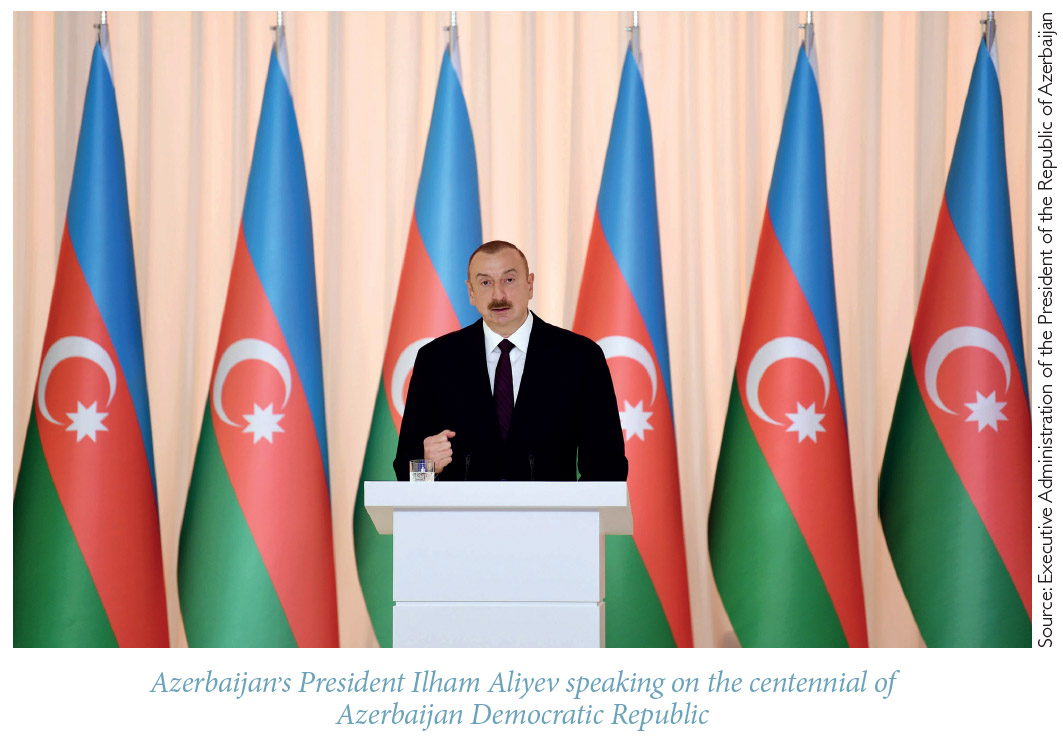
 Farhad Mammadov is Director of the Center for Strategic Studies under the President of the Republic of Azerbaijan (SAM). You may follow him on Twitter @Farhad_Mammadov. Fuad Chiragov is the Leading Research Fellow in the Foreign Policy Analysis Department at SAM. You may follow him on Twitter @FChiragov.
Farhad Mammadov is Director of the Center for Strategic Studies under the President of the Republic of Azerbaijan (SAM). You may follow him on Twitter @Farhad_Mammadov. Fuad Chiragov is the Leading Research Fellow in the Foreign Policy Analysis Department at SAM. You may follow him on Twitter @FChiragov.
"We [the Athenians] shall not trouble you with specious pretenses […] since you know as well as we do that right, as the world goes, is only in question between equals in power, while the strong do what they can and the weak suffer what they must."
– Thucydides, History of the Peloponnesian War
When we turn on our television sets or read newsfeeds from our favorite internet portals or other mass media sources, we discover that most of the information that makes headlines and breaking news originates from the great powers. This is especially evident if the consumer of said information comes from a small state. Commentators in such states even try, while talking about national or regional issues, to explain the relationship between these events (whether political, economic, or social) with reference to the policies, actions, and attitudes of global actors.
Sometimes events that are very insignificant from the point of view of great powers are given major prominence in the news headlines of outlets based in small states. Conversely, events in small states rarely make headlines in the media outlets of great powers—the only exceptions being revolutions, wars, coups, floods, and other such catastrophes resulting in considerable human casualties.
For small states, the world we live in is growing increasingly complicated and dangerous. Two phenomena are observed simultaneously: first, it is becoming increasingly difficult for a small state to pursue an independent foreign policy; second, it is becoming extremely difficult to maneuver among competing regional and global
powers, for their ambitions continue to rise exponentially as relations among them grow tense and rifts deepen.
Confusion All-around
The world and relations among states are today experiencing different, complicated, and often conflicting trends. Moreover, we are also witnessing qualitative transformations that are intellectually harder and more puzzling to theorize and understand.
On the one hand, the revolution in communication technologies brings the world together, increasing dependence among distant parts of the world. We thus see growing access for millions of people to economic and social opportunities and education.
On the other hand, we also see rising frustrations caused by growing dependence and integration, calls for, and attempts to create, self-isolation and a desire for economic protectionism.
All this helps propel populists and nationalists to power in different states. We see the very countries that for decades invested enormous resources in building, protecting, and promoting rules and principles of international affairs, the international economy, and international trade now implementing policies that have the cumulative effect of undermining, revising, and even ripping up the rules they led in establishing.
Some representatives of leading states who once claimed to represent the voice of humanity now don’t shy away from framing their discourse within a nationalist and egotistical narrative.
We are even witnessing some great powers announcing policies that lead to “trade wars,” which could in turn lead to unintended and unpredictable economic and political consequences that result in the suffering of billions of innocent people in different parts of the world.
Anxieties Abound
Overall, the dominant trend in global politics is that of drifting further and further away from established rules and principles. This is particularly alarming given the fact that various sorts of violations, including disrespect toward agreed principles and laws of international order, are being practiced, first and foremost with increasing regularity.

Great powers increasingly tend to view world affairs with much more of a “win-lose” principle than a “win-win” one, where their win comes at the cost of absolute loss for the other side.
Now the main idea in the headlines of the most prominent liberal journals, magazines, and publications is that the Liberal World Order, based on core “Western values” originating in Enlightenment thinking, is in retreat and crisis; that democracy is dying worldwide, and illiberal democracies are effectively replacing liberal ones.
Another increasingly observable cause of anxiety in the Western media, as well as among both liberal and right-wing western commentators, is the argument that the West is losing its five-centuries-long leading role on the world stage, and that the epicenter of world politics and economics is shifting towards Asia. This, as they collectively seem to believe, is resulting in the expansion of Asian powers and companies on different continents and markets.
All of this means that the world is entering a new period and we are currently in a sort of geopolitical interregnum. In other words, we are in a timeframe when the old world order is dying and the new world order is emerging. This time of interregnum—a transition from a period of certainty to one of uncertainty—is fraught with many risks, calamities, tectonic shifts, and threats.
This is especially true for the small and weaker actors in international affairs.
Disappearing Limits
For 70 years, great powers have endeavored to respect the principles and laws of international affairs, always looking to justify their policies and actions as being in the best interests of not only their own states, but of all humanity and the international system as a whole. Though they often failed to abide by the rules they themselves set, those failures did not become a new normal, but rather good indicators of how things should and should not be.
Adherence to these rules and principles used to be seen as the foundation of global ethical norms and the projection of an image of responsibility for each great power, which in turn formed the basis for the projection of soft power. Therefore, great powers paid a significant deal of attention to the psychological aspect of their policies, actions, and strengths with regard to their smaller partners, exercising their superiority in such a manner as to not appear threatening. Instead, they were supposed to represent a source of attractiveness, shared wealth, security, respect, and readiness to help and protect others.
For the past 70 years at least, the principles and laws of international relations imposed limits on the great powers, providing general assurances and a sense of security to smaller countries that, ultimately, the actions of great powers would occur within a known and predictable framework.
The aforementioned trends used to provide hope for smaller states that a better future was on the horizon, and that the intimidation and aggression of powerful states against weaker ones, much like wars and conflicts, would be relegated to an abnormal past. Justice was thought to eventually prevail, and small states—regardless of their size and capacity—would have an equal voice and would be treated as equal partners in international affairs.
Over the past 70 years, the liberal international order, with its institutions and laws, enabled small states to gain more power and a voice in international affairs. Of course, this was not approved openly by some politicians in the West, who argued that smaller states were “punching above their weight,” or, as Henry Kissinger contemptuously called such a state of affairs, “the tyranny of the weak.”
In this respect, it is worth mentioning that in 2011, just 20 years after gaining independence, Azerbaijan was able to be elected as a non-permanent member of the UN Security Council and to participate in decision-making processes on critical international affairs alongside great powers, such as the permanent members of UN Security Council.
Double Standards
Contrary to some idealistic expectations of the liberal “end of history,” over the past decade we have started to observe the emergence of opposing trends, in which major states are beginning to ignore and undermine the rules-based order—or at least to approach it selectively, with double-standards, and interpret its principles in relativist or situational terms, so as to suit their own economic interests.
This double-standard approach reveals itself in the case of the Nagorno-Karabakh conflict. While the implementation of four UN Security Council resolutions (822, 853, 874, and 884, related to a cessation of hostilities and withdrawal from the occupied areas of Azerbaijan) has been put on hold for 25 consecutive years, other UN resolutions were implemented just a couple of hours after their adoption.
During the previous decade we have seen certain states take on too much of a paternalistic “responsibility to protect” role—a doctrine allowing them to justify interference in the domestic affairs of other states, with the goal of influencing and shaping the foreign and even domestic policies of what are seen as mere objects of international relations.
During this time, the great powers have acted with increasing unilateralism, ignoring international institutions and law, and interpreting international law and principles in accordance with their own anti-altruistic understanding.
Along with the aforementioned trends, a more irrational and emotional course of action among the traditional great powers is also noticeable. In fact, the leaderships of these powers act according to their domestic public opinion. In other words, they reflect the desires of their people, who are increasingly nervous and worried about their respective countries losing their traditional leading roles, which then directly affects economic opportunities and material welfare.
The population thus blames immigrants and rising powers for its misfortune. The processes taking place in the Western world discredit the path they have chosen for themselves and imposed on the rest of the world. The democratic process of expression contradicts global integration, while there is a contradiction between the views of the political and economic elite of the Western world and the populations of Western countries.
Liberal interventions and global domination are challenged not by those states that are their target, but rather by the populations of countries in which the liberal order originated.
Qualitative Transformation
Interestingly, the world is experiencing qualitative transformation at all levels: Western liberal values once understood to be universal are suffering retreat not only at the international level and in non-Western countries, but also in the societies that served as the bastions and cradles of such values. We read more sociological studies on how Western liberal societies are starting to shift towards their traditional historical values, and how their Christian identities are becoming a growing consideration in their domestic and foreign policies.
In other words, the old international order—with its values, institutions, and principles—no longer reflects the interests and wishes of the traditional great powers. And now the old international order and people are in conflict.
This conflict translates into different forms of dismantling efforts. These include Brexit, growing economic protectionism trends, and trade wars. We still do not know how the world will look in the next stage of this evolution, much less after the conclusion of these transformative changes. Of course, we still do not know how all of the aforementioned factors will impact small states.
Historically, great powers viewed small states as helpless pawns and objects in world affairs, which can (and should) be dominated. This approach has, unfortunately, been revived and is becoming more obvious in the recent behavior of some great powers as they seek to impose their will on smaller states.
On the other hand, the psychology of small states always perceived great powers as cynical manipulators, intimidators, law- and rule-breakers and potential aggressors against their sovereignty. Therefore, small states always seek to reinforce a rule- and law-based international system, whereby all disputes are solved within a predictable and fair framework, regardless of states’ size and strength.
The general consensus in Western academia has been that the roles of small states in international affairs is omissible and that the most striking consequence of smallness is vulnerability. Little can be identified as an opportunity or advantage in smallness.
Another general and popular consensus in academic circles is that international affairs are largely defined by the perspectives of great powers. Small states can either join the bandwagon of threatening great powers or balance against them with another stronger state. According to most experts and analysts, small states most often opt to join the bandwagon and please great powers, rather than act against their will. In other words, the academic community usually does not take small states seriously in international affairs.
As such, the academic community does not consider the possibility of small states pursuing their own national interests in such a way that they come into conflict with those of great powers. Interestingly, this assumption is one of the main explanations of the tendencies of Western analysts to simplistically categorize states that arose from the former Soviet Union—or the former Yugoslavia, for that matter—as pro-Russian and pro-Western.
Of course, this categorization is sometimes done to render a given state’s perspective as a binary choice between “black and white”—or, in the words of former U.S. President George W. Bush, “you’re either with us, or against us.”
Facing the Challenge
As a small country, Azerbaijan’s foreign policy has often been regarded as a byproduct of East-West competition or geopolitical pressures exerted by regional powers.
Although being a landlocked country (without direct access to open seas) has always been an additional burden on Azerbaijan’s foreign policy, the country has been able to gain unique and valuable experience, both practical and theoretical, as a small state with difficult geography—one capable of pursuing an independent and balanced foreign policy in line with its national interests.
As President Ilham Aliyev has underlined: “Azerbaijan has abstained from all foreign policy adventures that might have created any risks and problems.” It has been a great challenge to pursue a foreign policy that complements Azerbaijani national interests while maintaining patience and not falling into emotional breakdown in a sensitive region like the South Caucasus.
It is more than evident that the widening of rifts among regional and great powers, and the deepening of qualitative transformations in international affairs require small states to have more sophisticated, intellectual, professional, and calculated foreign policies.







